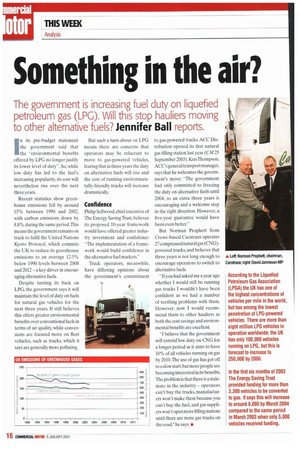Something in the air?
Page 16

If you've noticed an error in this article please click here to report it so we can fix it.
The government is increasing fuel duty on liquefied petroleum gas (LPG). Will this stop hauliers moving to other alternative fuels? Jennifer Ball reports.
In its pre-budget statement the government said that the "environmental benefits offered by LPG no longer justify its lower level of duty". So, while low duty has led to the fuel's increasing popularity, its cost will nevertheless rise over the next three years.
Recent statistics show greenhouse emissions fell by around 15% between 1990 and 2002. with carbon emissions down by 8.8% during the same period.This means the government remains on track to fulfil the United Nations Kyoto Protocol, which commits the UK to reduce its greenhouse emissions to an average 12.5% below 1990 levels between 2008 and 2012— a key driver in encouraging alternative fuels.
Despite turning its back on LPG, the government says it will maintain the level of duty on fuels for natural gas vehicles for the next three years. It still believes this offers greater environmental benefits over conventional fuels in terms of air quality, while conversions are focused more on fleet vehicles, such as trucks, which it says are generally more polluting. But such a turn-about on LPG means there are concerns that operators may be reluctant to move to gas-powered vehicles, fearing that in three years the duty on alternative fuels will rise and the cost of running environmentally-friendly trucks will increase dramatically.
Confidence Philip Sellwood.chief executive of The Energy Saving Trust, believes its proposed 10-year framework would have offered greater industry investment and confidence: "The implementation of a framework would build confidence in the alternative fuel markets."
Truck operators. meanwhile, have differing opinions about the government's commitment to gas-powered trucks. ACC Distribution opened its first natural gas filling station last year (CM 25 September 2003). Ken Thompson, ACC's general transport manager, says that he welcomes the government's move: "The government had only committed to freezing the duty on alternative fuels until 2004, so an extra three years is encouraging and a welcome step in the right direction. However, a five-year guarantee would have been even better."
But Norman Prophett from Crewe-based Caratrans operates 27 compressed natural gas (CNG)powered trucks, and believes that three years is not long enough to encourage operators to switch to alternative fuels.
"If you had asked me a year ago whether I would still be running gas trucks I wouldn't have been confident as we had a number of teething problems with them. However, now I would recommend them to other hauliers as both the cost savings and environmental benefits are excellent.
"I believe that the government will extend low duty on CNG for a longer period as it aims to have 10% of all vehicles running on gas by 2010.The use of gas has got off to a slow start. but more people are becoming interested in its benefits. The problem is that there is a stalemate in the industry — operators can't buy the trucks, manufacturers won't make them because you can't buy the fuel. and gas suppliers won't open more filling stations until there are more gas trucks on the road." he says. •
















































































































































































